Liam Neeson's 20 best performances
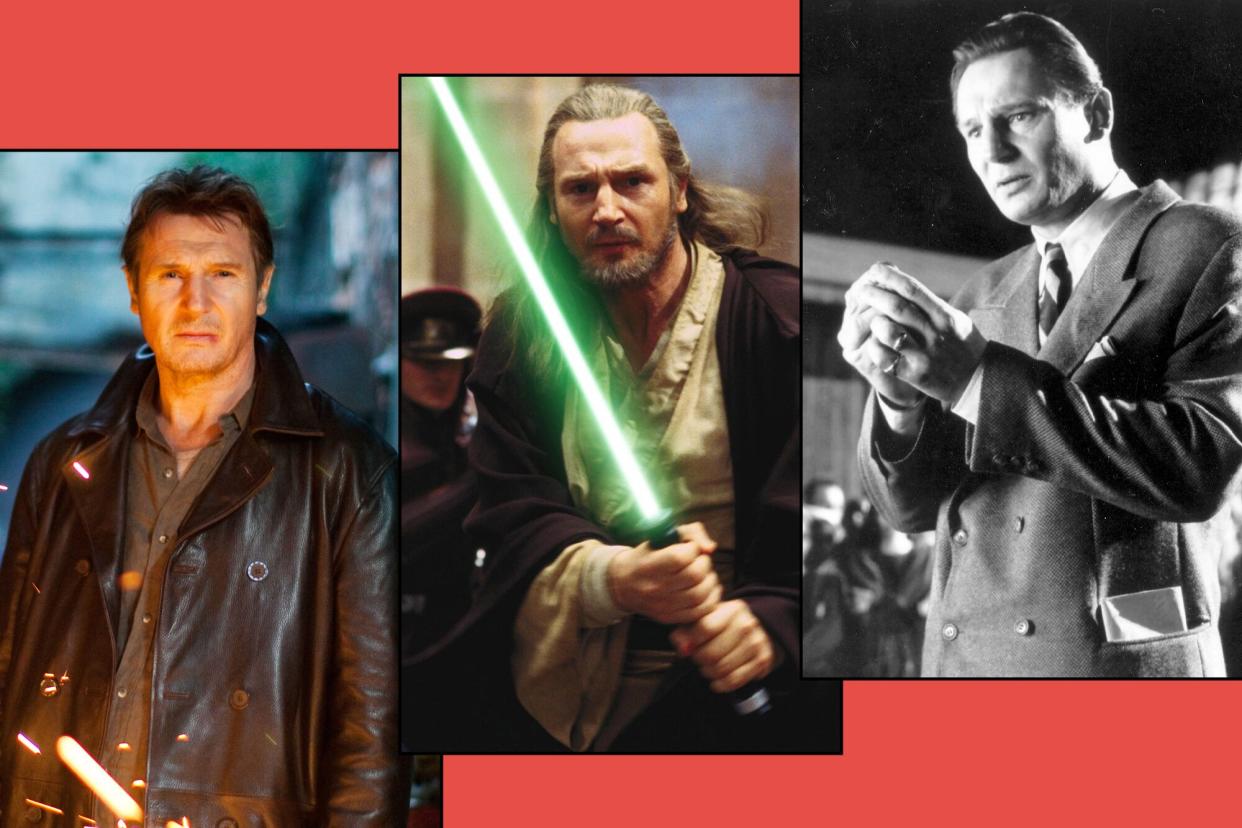
- Oops!Something went wrong.Please try again later.
- Oops!Something went wrong.Please try again later.
As a child growing up in Northern Ireland's County Antrim, future journeyman actor Liam Neeson, somewhat unexpectedly, fell into a career of boxing. He won several regional championships before quitting at 17, at the behest of his parents, who wished for their son to study business as opposed to fisticuffs. This never transpired as Neeson was drawn to the theater immediately after giving up his gloves and working as a forklift driver and lorry operator at a Guinness factory before landing his first major role at Belfast's acclaimed Lyric Players Theatre. "Every town in Ireland has their own troupe," Neeson told EW back in 1994. "The weather's so fookin' awful, people are indoors all the time resortin' to tellin' yarns."
Neeson got his break when director John Boorman (Deliverance) went to Dublin and saw Neeson perform as Lennie in Of Mice and Men. The director offered Neeson his first major film role as Sir Gawain in 1981's Excalibur. On the set of that film, Neeson met Helen Mirren, who became first a drinking buddy and then a romantic partner. Neeson followed Mirren to Los Angeles, where she helped him attain American representation. Neeson was selected by Jeff Kanew (director of the indisputable classic Troop Beverly Hills) for the lead role in Dead Poet's Society before Peter Weir took over production duties and brought in Robin Williams. However, Neeson's audition tape featuring him performing the famous "carpe diem" monologue made its way around Hollywood, gathering an A-list support group, among them Dustin Hoffman, who reportedly told Neeson that "I couldn't have been better than you in [the carpe diem] scene."
Higher-profile roles soon followed, portraying the heavy in the Dirty Harry sequel The Dead Pool, being the cool-under-pressure middleman in Woody Allen's Husbands and Wives love triangle, and starring as the title character in Ethan Frome. Everything changed, however, when Steven Spielberg cast Neeson as Oskar Schindler in Schindler's List, a role for which the actor received his first (and, as of now, only) Oscar nomination. A run of prestige pictures would follow, which often found Neeson embodying historical figures.

Everett Collection; Lucasfilm/Kobal/REX/Shutterstock; Everett Collection Liam Neeson in (from left to right): 'Taken,' 'The Phantom Menace,' and 'Schindler's List'
Then, in 2009, Neeson took a most unexpected role in the Europacorp-produced, Bourne-inspired crunch-up Taken. Opening in France, China, and the U.K. long before it washed up on American shores, Taken quickly set the box office alight, earning $226.8 million worldwide. (When it was released stateside, it notched the second-highest opening for a Super Bowl weekend.) Sequels followed, in addition to a plethora of other physically intensive roles for Neeson, who remains elated at his late-career turnabout.
"They started sending me action scripts and you'd see 'Leading man, age 37' crossed out and 'late 40s, early 50s' written in instead," Neeson told EW in 2019. "I feel very privileged, and a little bit guilty. I'm having fight scenes with guys half my age and I just can't stop laughing. It's just so silly on one level and great fun on another… If I can intersperse them every now and then with A Ballad of Buster Scruggs or Martin Scorsese's Silence, you couldn't ask for a better career than that."
This week marks the release of Marlowe. Directed by Neeson's frequent collaborator Neil Jordan, this neo-noir sees Neeson stepping into the role of Phillip Marlowe, the iconic private eye created by Raymond Chandler. It also happens to mark Neeson's 100th role on film. We don't imagine it's anywhere close to his last, though: The actor currently has several projects on the horizon, including potentially stepping in for Leslie Nielsen in Akiva Schaffer's reboot of The Naked Gun.
To celebrate one of the most prolific and multifaceted actors working today, here are EW's picks for Liam Neeson's 20 best performances, ranked.
<i>The Phantom Menace</i> (1999)
Jedi Master Qui-Gon Jinn (Neeson) and his apprentice, Obi-Wan Kenobi (Ewan McGregor), are tasked with putting an end to an intergalactic trade war (blech) that threatens to destroy the Galactic Republic. On their journey, Qui-Gon Jinn encounters young Anakin Skywalker (Jake Lloyd), whom the elder believes is the "Chosen One" who will restore balance to the Force.
With nearly a quarter century of retrospect, The Phantom Menace looks a lot better than it did in 1999. It's still a wildly misguided effort, to be certain. The fact that such a silly movie is predicated on intricate intergalactic legislation is both mind-boggling and eminently respectable. Credit is due for trying something different, a template that often produces the most interesting — if least well-received — pictures in the Star Wars franchise.
Through all of it, though, Neeson maintains a stoic presence that prevents the movie from lifting off into a digital netherworld. "If there's an actor who holds The Phantom Menace together, it's Liam Neeson," wrote EW's Owen Gleiberman in his original review. "Tersely commanding, he gives the film its only hints of emotional dynamism."
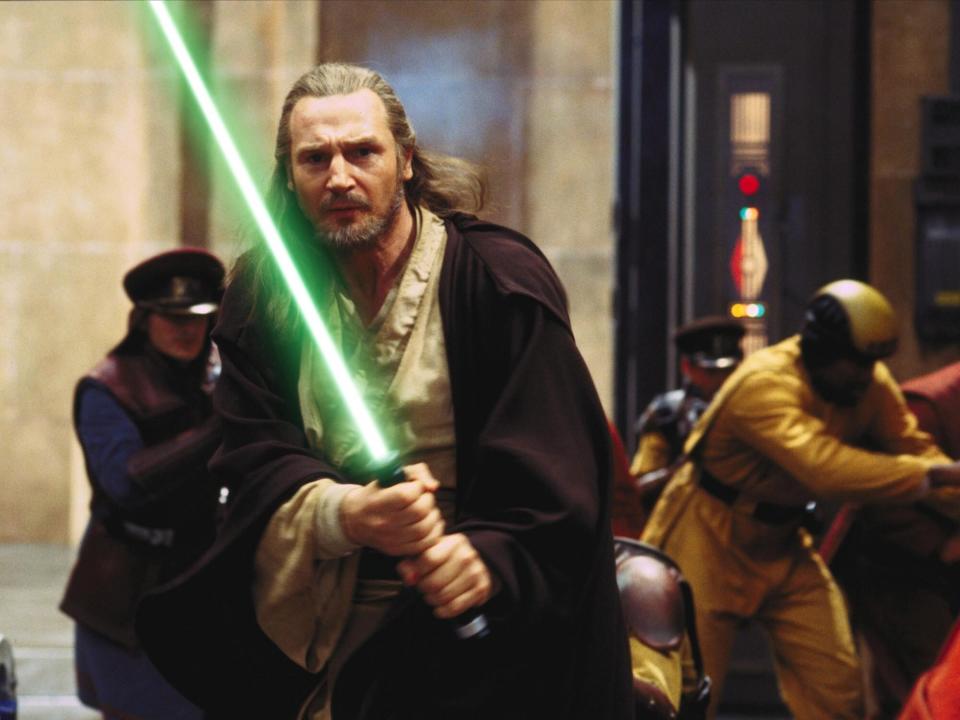
19. <i>Suspect</i> (1987)
Carl Wayne Anderson (Neeson), a deaf and mute man, is accused of murdering a young Justice Department employee. Defending him is overworked attorney Kathleen Riley (Cher), who joins forces with one of the jurors, lobbyist Eddie Sanger (Dennis Quaid), to gather more evidence on the crime and out the real murderer.
Peter Yates, director of Bullitt and Breaking Away, helmed this taut thriller, which mixes well-shaded characters (look out for Fred Melamed as Cher's work pal) rather winningly with baroque slasher tropes that late-'80s "mature" thrillers loved to flirt with. Though the ending was considered a terrible cheat at the time of release, it doesn't seem as ill-devised in retrospect, possibly because thrillers of this ilk in the proceeding years have indulged in far more ludicrous third-act revelations.
Neeson embodies a tremendously tricky character here, speaking no dialogue and doing a great majority of his acting using only his eyes. Not to mention, he has only about 15 minutes of screen time, yet the entire movie depends on the audience's sympathies for Carl. (It's made clear from the beginning that he's a scapegoat, but in a much larger conspiracy.) It's one of the actor's most heart-rending performances, one of the rare times — in a career of formidable historical figures as butt-kicking dads — that Neeson plays a completely helpless character.
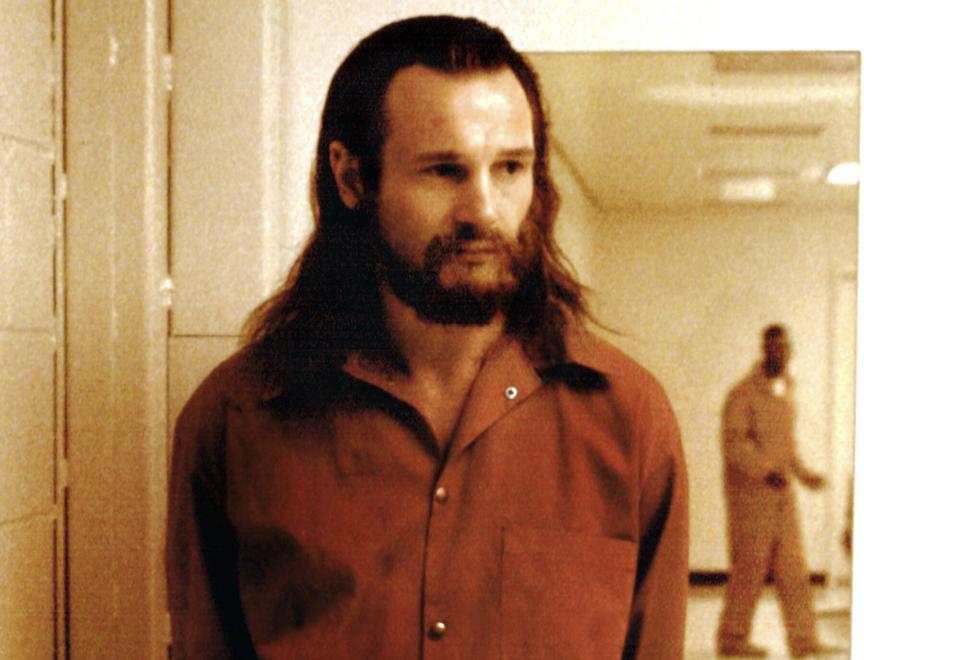
18. <i>Widows</i> (2018)
After her husband, Harry (Neeson), is killed in a crazed shootout with police following a botched robbery, Veronica (Viola Davis) is informed — in no uncertain terms by local politician Jamal Manning (Brian Tyree Henry) — that she is now responsible for the money lost in the raid. Using a heist playbook Harry left behind, Veronica tracks down the other widows from Harry's team, Alice (Elizabeth Debicki) and Linda (Michelle Rodriguez, in her best performance since Girlfight), to pull off the job.
Though certainly not the first person you think of when considering popcorn thrills, it's impossible to imagine someone more appropriate than Steve McQueen, director of painful dramas Hunger, Shame, and 12 Years a Slave, to bring Widows to the big screen. A passion project adaptation of the 1983-85 British series (which McQueen co-wrote along with Gone Girl scribe and former EW writer Gillian Flynn), Widows wisely supplants the jolly-hockey-sticks tone of so many heist films with real-world stakes, all rooted in the highly recognizable socio-economic disparity within its central foursome. (Cynthia Erivo, while not a widow, serves as a late addition to the crew, while Carrie Coon has a small but pivotal role as the fourth widow, stuck home nursing her newborn baby.)
McQueen uses Neeson wonderfully here, exploiting and subverting his action-star status (no spoilers here, you'll have to see it for yourself). Even amidst such a strong ensemble, it's his performance which offers the most duality (in quite a limited amount of screen time, too). Though the other heavies on display — Henry, along with Robert Duvall and Colin Farrell as a skin-crawling father/son duo — all give lived-in performances, Harry's characterization remains the least clear-cut, rendering him a haunting quality that lingers long after the credits roll.
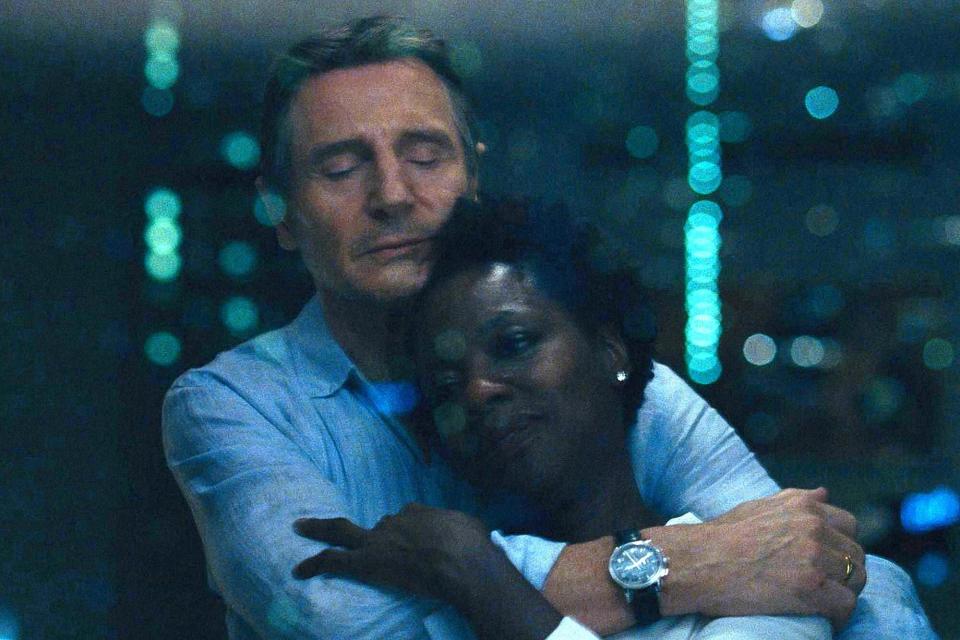
17. <i>Breakfast on Pluto</i> (2005)
Neil Jordan's decades-spanning fairy tale follows Patrick "Kitten" Braden (Cillian Murphy), who was abandoned at a young age by her mother upon the doorstep of her parishioner pop, Father Liam (Neeson), who in turn gave the child over to a foster home. Though born male at birth, she discovers her true gender at an early age, which is met with resistance and disdain from her adoptive family. Kitten thus opts to flee the closed-minded Irish village to find her birth mother, an odyssey that will see her join a glam rock band, work as an assistant to a kindly magician (The Crying Game's Stephen Rea), and eventually bump up against the violent ideologies of the IRA.
Breakfast on Pluto is one of Jordan's brightest films and also his most inconsistent, fitfully fun and grueling in equal measure. What makes Neeson's performance here so powerful is that he's the only part of Pluto that feels tethered to a recognizable reality. So much of Jordan's film is driven by quirk, and then here comes Neeson in a pivotal role as Kitten's father. The movie's finest beat, indeed the only one containing any lasting emotion, takes place between Neeson and Murphy in a peep show booth, where the priest has come to find his daughter in order to finally reveal information that might lead to her birth mom.
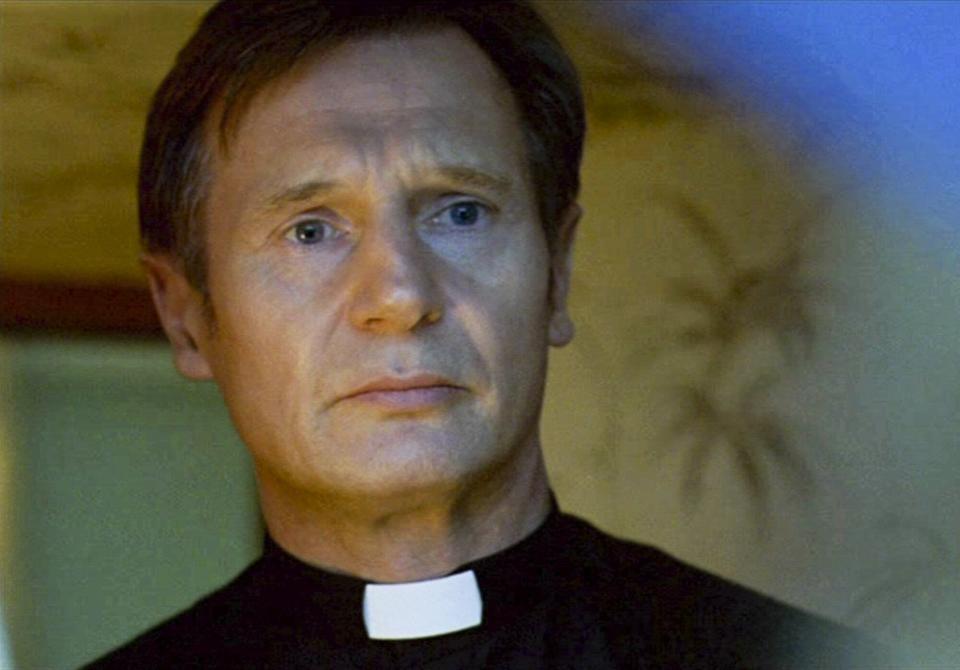
16. <i>Lamb</i> (1985)
Conflicted over his pledge to God and the strict regime at the Roman Catholic school where he works, Michael Lamb (Neeson), better known to his flock as Brother Sebastian, flees the congregation with 10-year-old Owen (Hugh O'Conor) in the hopes of creating a better life.
Colin Gregg's hidden gem picture, an adaptation of the book by Mark McLaverty (who wrote also the screenplay), is the epitome of Irish tragedy. It's a remarkably heart-wrenching film with a devastating conclusion, yet for much of Lamb, there is a great sense of hope. The liberation the two hopefuls feel — Lamb from his religion and Owen his confinement — is palpably conveyed through the boiling performances of Neeson and O'Connor as well as Gregg's visceral direction, and you cannot help but be swept away by Michael Garfath's opulent cinematography.
When questioned in an interview on Borderline — RTÉ's short-lived "young people's show" — regarding why he's drawn to playing men of the cloth, Neeson responded, "I think somebody's trying to tell me something. My mother's delighted, she has photographs of me in various priests garbs, ya know, up on the mantelpiece and [she tells visitors], 'That's my boy, that's my son!'"
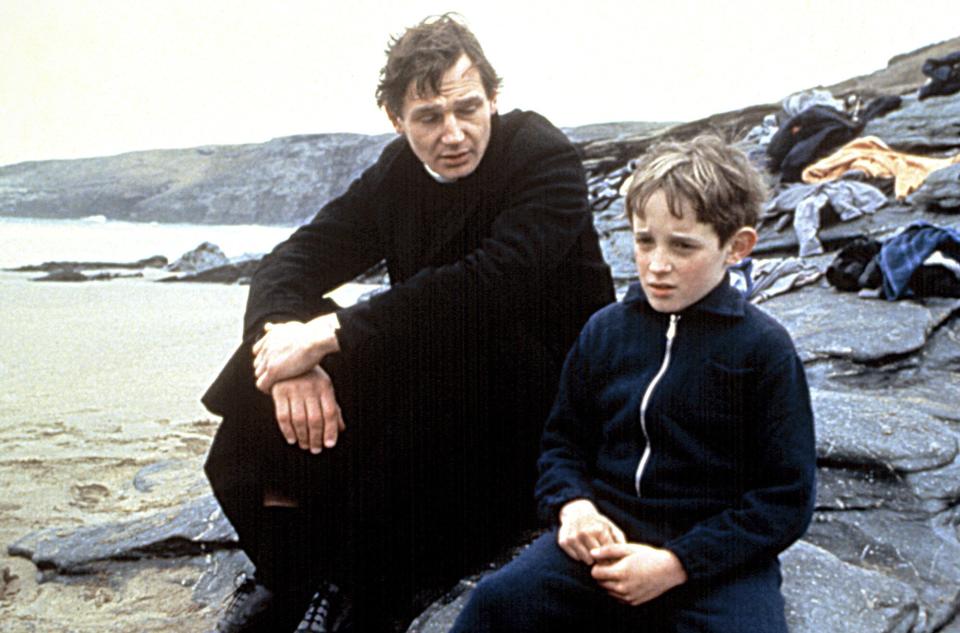
15. <i>Taken</i> (2008)
When his daughter Kim (Maggie Grace) falls victim to human traffickers on a trip to Paris, ex-CIA officer — and ex-Green Beret, don't forget — Bryan Mills (Neeson) travels abroad to exercise his extraction muscles.
Taken is the movie that jump-started Neeson's career as a gun-toting family avenger, and it remains the best of the ever-expanding lot. District 13 director Pierre Morel's Euro-thriller is an exceptional film of its kind. It's efficient (under 90 minutes!), joyfully brutal (truck make thug go splat real good!), and has a nice through-line of subtle humor running through it that never feels the need to call attention to itself. (Plus, the acting is ace all around — especially from Famke Janssen, who is believable and heartbreaking as Grace's mother.)
Neeson, too, has created a real character here. He's committing every bit as much to Bryan Mills as he does Rob Roy, Michael Collins, or Ra's al Ghul. Unlike in the sequels (which instantly degenerated into quick-cut inanity) and most of Neeson's subsequent action pictures, Mills has a vulnerability. Despite his training, he still seems out of his league, which leads to a terrific amount of suspense.
Yet, despite giving it his all on set, the star never expected Morel's film to take him anywhere, let alone to the multiplex, as Neeson told EW in 2019: "Taken was an accident. I never focused on, 'Oh, I'd love to do action movies.' It wasn't really on my periphery. I read [it] and just thought, 'This would be great; just hang out with stuntmen every day and beat guys up.' I did think it would be straight-to-video, and that was no problem."
Between 2008-2022, Neeson has led nearly 20 tales of vengeance, some of which are better than others. Although his turn into action is often the butt of jokes, the vast majority of these projects are quality, mid-budget adult thrillers that are sorely lacking in the multiplex nowadays. A few of his best include Run All Night (2015), the pulse-quickening Cold Pursuit (2019), and Scott Frank's grisly, mournful noir A Walk Among the Tombstones (2014).
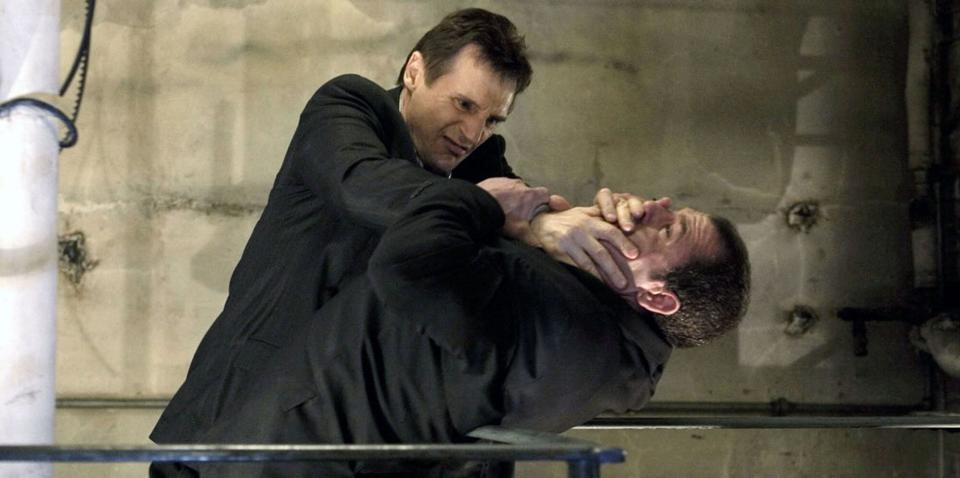
14. <i>Silence</i> (2016)
Years after Jesuit priest Father Ferreira (Neeson) goes missing in Japan on a mission to convert locals, word returns home that he has renounced his faith and adopted a new life. Refusing to believe such a thing, two of Ferreira's pupils, Father Rodrigues (Andrew Garfield) and Father Garupe (Adam Driver), set out on a perilous journey to find him.
Martin Scorsese's funeral historical epic deals with some tremendously dark material with a very heavy hand, occasionally making it hard to stomach on multiple levels. It is, however, one of the most astoundingly photographed films in recent memory (courtesy of Rodrigo Prieto, Scorsese's frequent collaborator as well as cinematographer on Greta Gerwig's upcoming Barbie), which culminates in an unexpectedly cathartic resolution.
Ferreira is one of Neeson's most complicated and conflicted characters. Again, his screen time here is relatively brief, appearing in a harrowing opening sequence before turning up again in the final 40 minutes, with his presence looming over Rodrigues and Garupe's entire journey. Spoiler alert: They soon learn their mentor has indeed renounced his faith, now adopting a Japanese name and living peacefully with his captors. The central question hanging over this sequence is whether or not Ferreira has done this out of choice or survival. Neeson plays this duality with a deft charge that practically drives a knife into your side, enacting a state of such palpable conflict and emotional pain that the actor has never before achieved on screen.
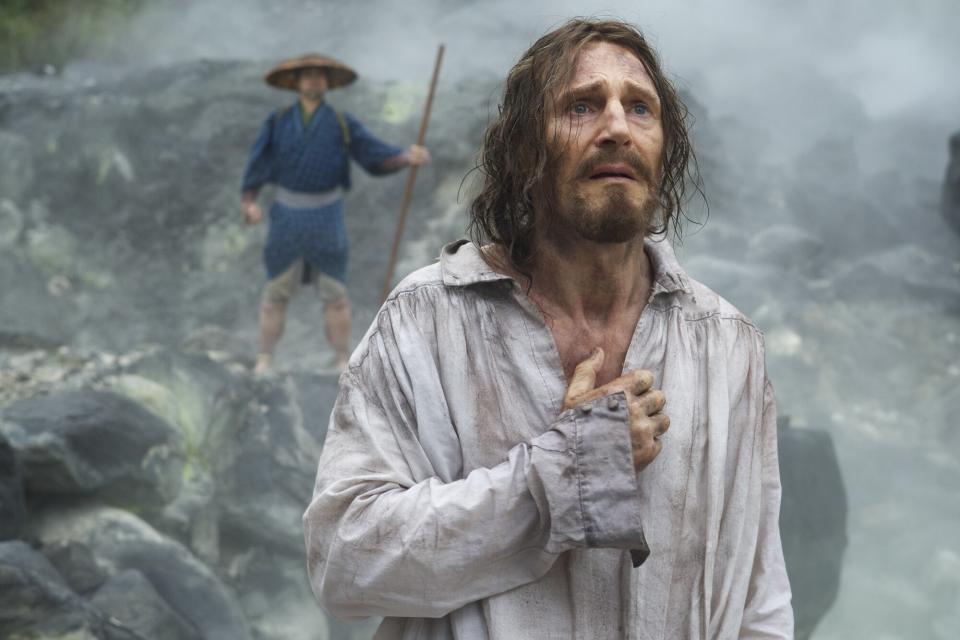
13. <i>Love Actually</i> (2003)
Richard Curtis' classic Christmas anthology follows nine stories intertwining strangers throughout London who are soon to realize that love really is all around. Neeson plays the recently bereaved Daniel, who embarks upon a mission to help his stepson Sam (Thomas Brodie-Sangster) impress his schoolyard crush.
Love Actually contains a few stories that fall on the more serious end of the love spectrum. Laura Linney's thread most adeptly balances tragedy and joy, and we'll always hold dear Emma Thompson's stoic meltdown, but it's Neeson's arc that hits the closest to home, both for audiences and the actor. (Neeson's wife, Natasha Richardson, died unexpectedly in 2009 after sustaining a head injury in a skiing accident, leaving him to raise their two sons.) Neeson's bond with Sangster as his stepson is the most affecting relationship in the film — the two feel so connected as if they are really family, and their storyline provides the highest quotient of heartwarming moments.
Though Neeson has admitted to not having rewatched the film since the premiere, he told E! News that he holds it in fond regard: "I think it's a beautiful film, I really do. Not least because at the opening of that film you hear [Hugh Grant's monologue] and you're immediately gripped. I defy anybody to watch that and not think, 'I want to watch more of this.'"
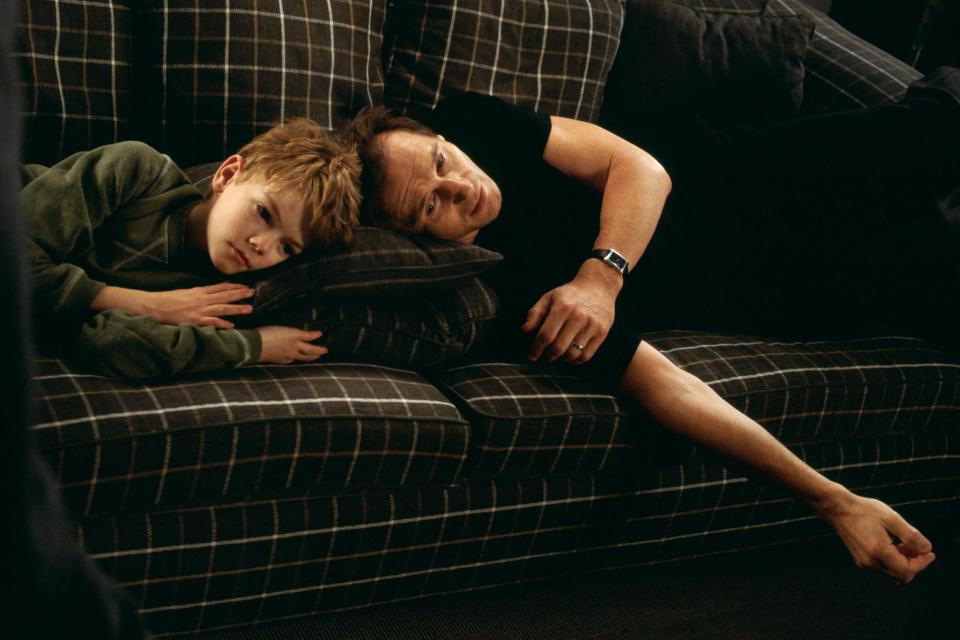
12. <i>Nell</i> (1994)
Nell (Jodie Foster) has lived her entire life closed off from society, existing solely in a small cabin with her mother sequestered deep within the woods. After her mother's death, Nell is discovered by local physician Jerome Lovell (Neeson). Lovell teams up with psychologist Paula Olsen (Natasha Richardson) to study her, but Dr. Alexander Paley (Richard Libertini) believes Nell is feral and wishes to have her institutionalized.
Much has been made of Foster's Oscar-nominated performance, and for good reason, but the work of Neeson and Richardson (who was always such a chameleonic actress) is often overlooked in praise for the film's star. Neeson makes a tremendously tricky character surprisingly lovable here; it would be easy for this role to slip into a savior trope, but Neeson foregrounds Lovell's compassion for Nell with such conviction that you never doubt him for a single moment.
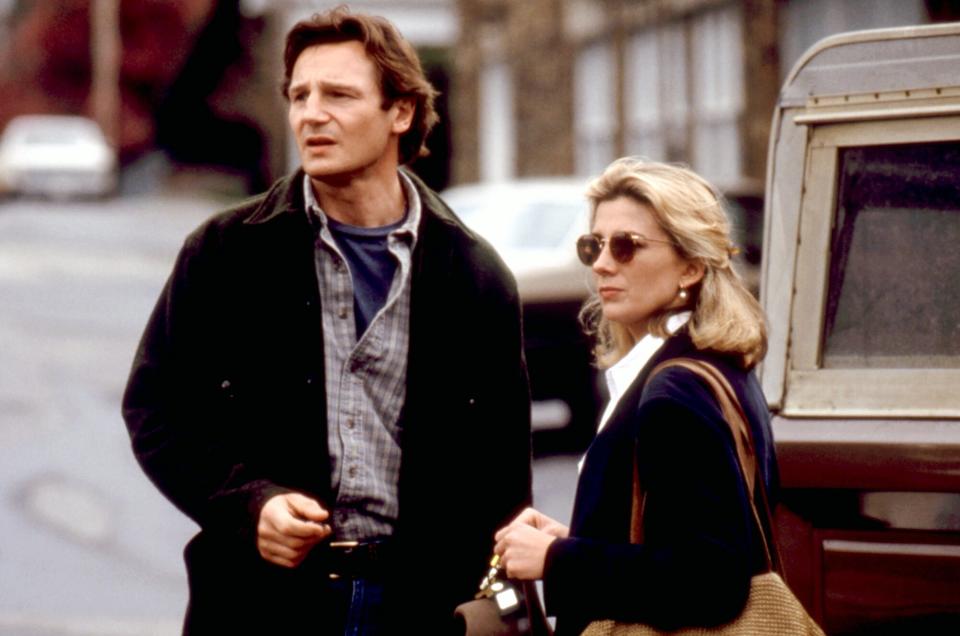
11. <i>A Monster Calls</i> (2016)
Twelve-year-old Conor (Lewis MacDougall) struggles during the day with bullies at school and returns every night to take care of his ailing mother (Felicity Jones) between her chemotherapy appointments. His imperious grandmother (Sigourney Weaver) wishes for Conor to come and live with her, but the young boy can't imagine leaving his beloved mum. He begins to retreat into a fantasy world presided over by the Monster (the voice of Neeson), who regales Conor with stories that initially provide the boy much comfort. As they go on, however, Conor begins to realize the Monster's tales have one common lesson: Life is messy, and it promises no happy endings.
J.A. Bayona (The Orphanage, The Impossible) directed this luminous downtrodden fairy tale that handles the saddest experiences one can encounter when coming of age (loss of a parent, bullying, depression, grief, heartbreak) with eminent grace. It's a top-tier family film, despite its lower-end PG-13 rating (for themes related to illness, and a few spooky moments within the Monster's stories).
Neeson gives an exceptional vocal performance here, rendering the Monster fearsome and warm in equal measure. As he becomes something of a demented father figure to Conor, and the Monster's recurring presence in the boy's family makes itself apparent, Neeson brings a melancholy and weariness to the character which blends seamlessly with the film's beliefs. His work here ranks as one of the finest pieces of voice acting — and one of his most moving performances to date.
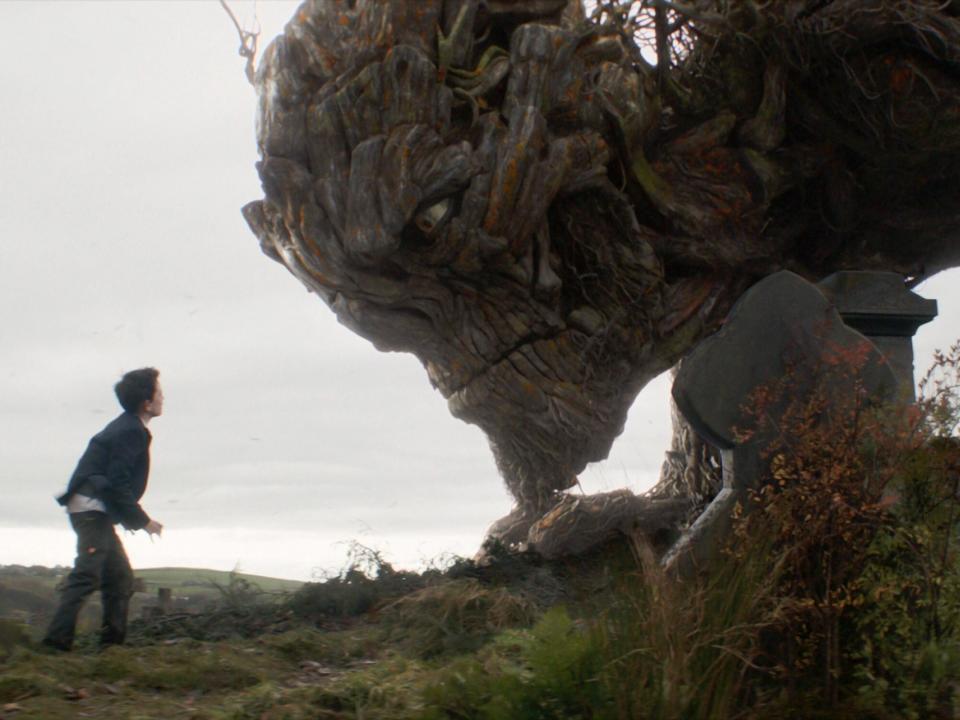
10. <i>Batman Begins</i> (2005)
Christopher Nolan's first installment in his Dark Knight trilogy finds Bruce Wayne (Christian Bale) traveling to the Far East, ending up in a Bhutan prison where he is ultimately found by Henri Ducard (Neeson). Ducard recruits Wayne into the League of Shadows, headed by the mysterious Ra's al Ghul, but the young heir discovers that the group has sinister plans for Gotham City. Unable to see his home destroyed, Bruce torches the monastery (killing Ra's al Ghul, but saving Ducard) and hoofs it back to Gotham, determined to clean up the city without resorting to murder.
Nolan's robust franchise-sparker continues to astonish, thanks largely to practical effects work and the director's expert melding of the art house and the multiplex. As he has done throughout his career (and a few times on this list), Neeson employs an exquisite set of tricks to throw the audience off of the ultimate reveal (once again, spoilers ahead).
As the effete mentor to Wayne in the film's first half, Neeson nicely toys with the audience without tipping his hand. When the film returns to Gotham, and it's revealed that Ducard and Ra's al Ghul are one and the same, his performance takes on a villainous dynamism that the actor has had precious few opportunities to exercise throughout his career. Neeson brings something otherworldly to the part, making his appearance in Nolan's recognizable metropolis all the more stunning.
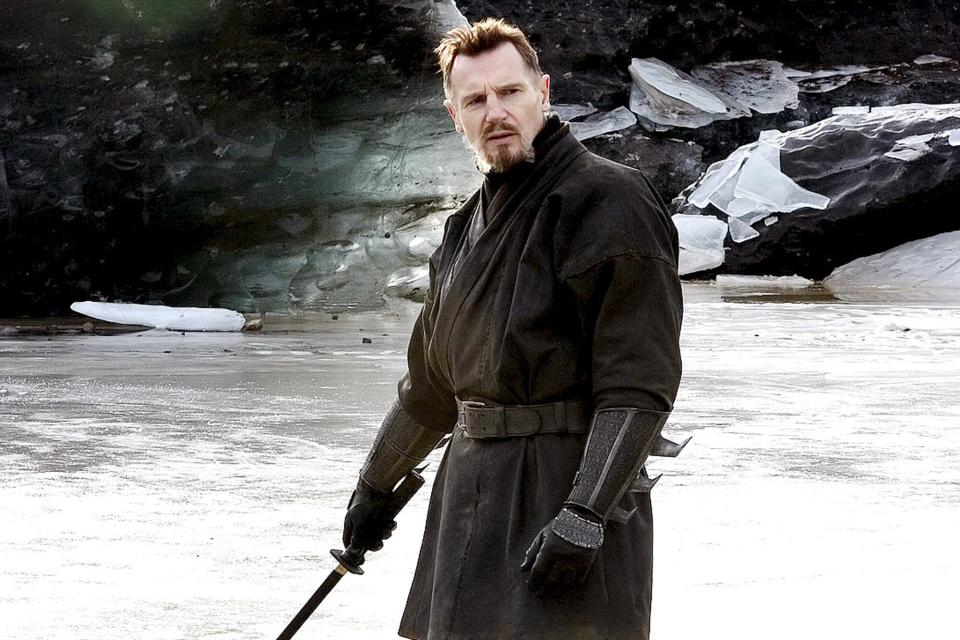
9. <i>Darkman</i> (1990)
In search of an incriminating document, crime boss Robert G. Durant's (Larry Drake) tough guys raid the laboratory of Dr. Peyton Westlake (Neeson), who knows nothing of what they seek. Unsatisfied with the doctor's answer, they kill Peyton's assistant and blow up the building, leaving him for dead. Yet it just so happens that Peyton had been developing synthetic skin to assist burn victims, and after his release from the hospital, the doctor reunites with his girlfriend, attorney Julia Hastings (Frances McDormand), and sets about enacting sweet revenge on those who left him disfigured.
After director Sam Raimi pursued the film rights to the pulp fiction character The Shadow and was unceremoniously rebuffed, he set out to design his own superhero, writing a short story that was inspired in equal parts by Universal horror pictures of the '30s and doomed love stories of the same era. Universal quickly greenlit a film version, and although the studio was worried that the film would bomb after poor test screenings, Darkman went on to gross $8 million in its opening weekend ($18.1 million today) and quickly cemented its reputation as a cult classic thanks to Raimi's singular vision.
Neeson, under gobs of stomach-churning makeup for a great deal of the run time, delivers a pitch-perfect performance that beautifully blends high camp and wrenching pathos. It's a shame that he's not yet had another chance to work with Raimi, as Neeson understands the director's tone perfectly. When asked by Charlie Rose about his experience with Darkman, Neeson gushed: "Oh, I loved it. It was great fun…Sam Raimi is quite a genius, I think. Just a great guy to work with."
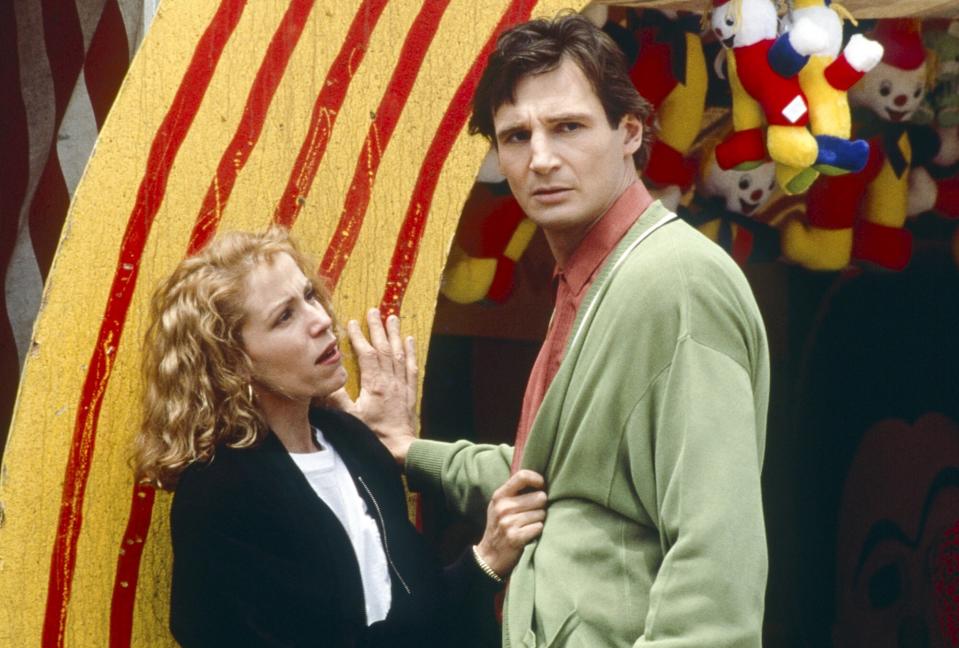
8. <i>Husbands and Wives</i> (1992)
Gabe (Woody Allen) and Judy (Mia Farrow) are devastated when their best couple friends, Sally (Judy Davis in an Oscar-nominated performance) and Jack (Sydney Pollack), announce their impending divorce. This revelation infests Gabe and Judy, who start questioning their own union. Gabe begins a tentative flirtation with Rain (Juliette Lewis), one of his university students, while both Judy and Sally enter into a courtship with down-to-earth Michael (Neeson).
Husbands and Wives is another of Allen's greats, being a scabrously funny and tragically insightful examination of married life, single life, and every tricky thing that lies in between. Meanwhile, cinematographer Carlo Di Palma shoots in a near-experimental style, all handheld camera work and vérité placement, that puts us in the same frenzied, discombobulated headspace of the characters.
Neeson plays Michael as a slightly tragic figure, a man desperately seeking genuine connection who has suddenly found two of them at once, only to realize he's directly in the middle of a situation for which he is woefully unprepared. It was none other than Diane Keaton, Neeson's costar in Leonard Nimoy's romantic drama The Good Mother, who convinced Allen that the only choice for the role was Neeson. "Woody Allen is not the kind of director who interprets your character's motives for you," Neeson told EW back in '94. "So I just decided to play it the way I would if I were in that situation in real life. Just to be a bit of calm in the midst of the situation whirling around me."
Husbands and Wives was the final of the 13 collaborations between Woody Allen and Mia Farrow, who split up in the middle of production after Farrow uncovered evidence of Allen grooming and assaulting her then-underage adopted daughter, whom they had raised together for much of her life. As it happens, Neeson was caught in the crossfire of that cultural blast, telling GQ in 2014 that the horrifying revelation actually disrupted the filming process.
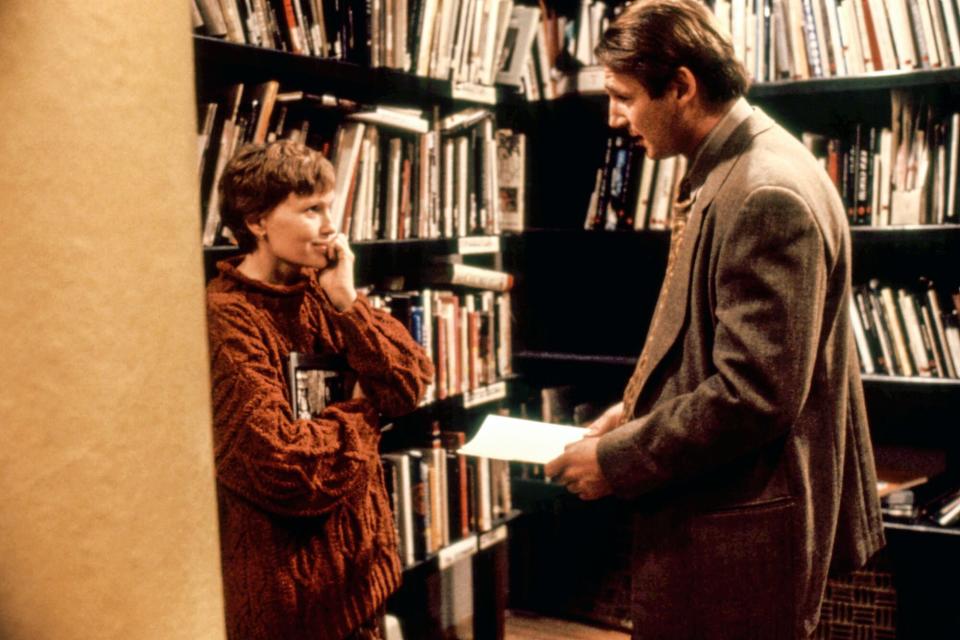
7. <i>The Grey</i> (2012)
On their way home from a month-long shift at an Alaskan oil refinery overseen by sharpshooter John Ottway (Neeson), a crew's plane goes down over the wilderness, leaving just eight of the men alive. Among those joining Neeson in the wilderness are Dermot Mulroney, Frank Grillo, and Dallas Roberts, who quickly realize that the worst is yet to come as hungry wolves descend upon the survivors.
Joe Carnahan — who directed Neeson to a gonzo comic turn in 2010's pleasantly unhinged reboot of The A-Team — here turns his attention to a different kind of genre entirely. Dismissed upon release as "the movie where Liam Neeson fights a wolf," The Grey is, in fact, an astonishing film, lyrical and practically Shakespearean in its execution, and is certainly the most mature work Carnahan has produced yet.
A pervasively harrowing survival thriller, The Grey boasts some of Neeson's best work. In fact, early screenings had industry insiders praising his performance as "Oscar-bait" based on having seen just a half hour of footage. Ultimately, Neeson was not nominated, but he certainly should have been.
The actor has been transparent about drawing upon his late wife's death to inform Ottway, who, when we meet him, has just lost his own wife to cancer and is contemplating suicide as his life seems unimaginable without her. In a penultimate scene in which Ottway pens a letter to his lost love, Carnahan requested that Neeson "channel his grief" over Richardson's absence, resulting in one of the finest moments in Neeson's oeuvre.
"This group of guys… we shared the tragedies we had experienced. Everybody was very open about it. It kind of set the tone when the cameras weren't rolling," Grillo told EW at the film's premiere. "[Liam] said a lot of things. Obviously, he has had a lot of tragedies in his life. And he shared about some of that. It was wonderful. I was really honored that he would trust enough to talk about that." Fellow costar James Badge Dale expressed to us similar accolades for the star: "What Liam did in rehearsal was stand up and say, 'I'm here for all of you. I'm here if you have questions, and I need your help too.' It created a culture where everyone wanted to share."
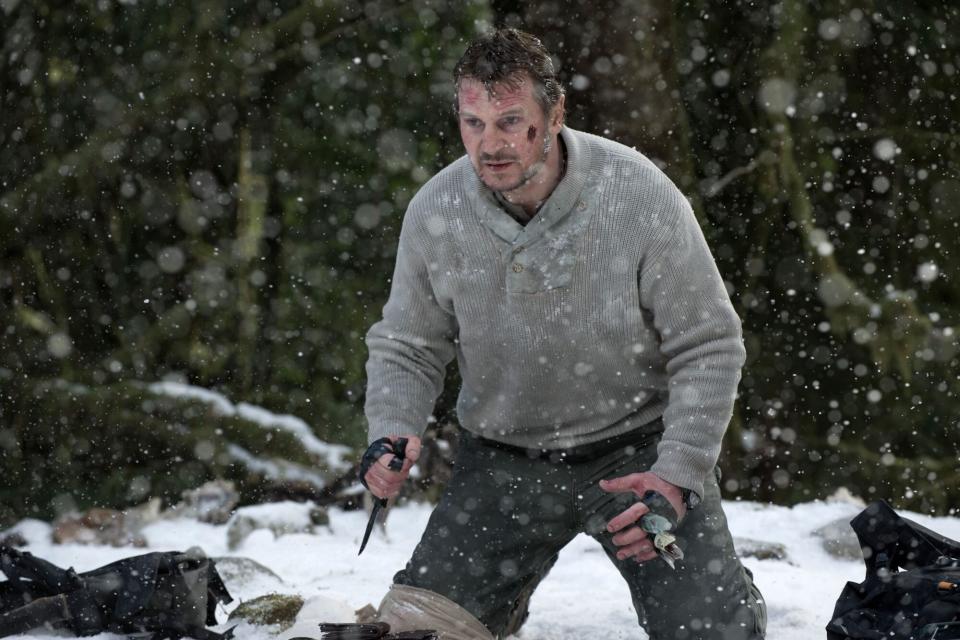
6. <i>The Mission</i> (1986)
Father Gabriel (Jeremy Irons) and John (Neeson) enter South America to convert its people and build a mission. In time, they're joined by reformed slave trader Rodrigo Mendoza (Robert De Niro), who wishes to redeem himself. But when the mission's land is transferred from Spain to Portugal, the Portuguese government attempts to capture the native people for labor, prompting Gabriel and Mendoza to defend themselves — and their people — from certain annihilation.
Roland Joffé's resplendent epic won the Palme d'Or at the 1986 Cannes Film Festival as well as the Academy Award for Best Cinematography at the '87 ceremony. It's a lyrical and rousing picture with fine work from the entire cast, especially De Niro, who relishes his role as the swarthy swordsman. As Fielding, Neeson is the calm in the midst of the storm, providing the film with some of its most potent dialogue and images.
"It was long, it was arduous, and an incredible bundle of fun," Neeson told Borderline of shooting the picture. "Absolute joy. We were out there for four months... and it made me very aware of the plight of certain tribes of people who are on the point of extinction. Their natural habitat, their way of life, is gradually being eroded away. So the film on that level, on the spiritual level, it made me very aware of their plight and helped me to rediscover my own faith."
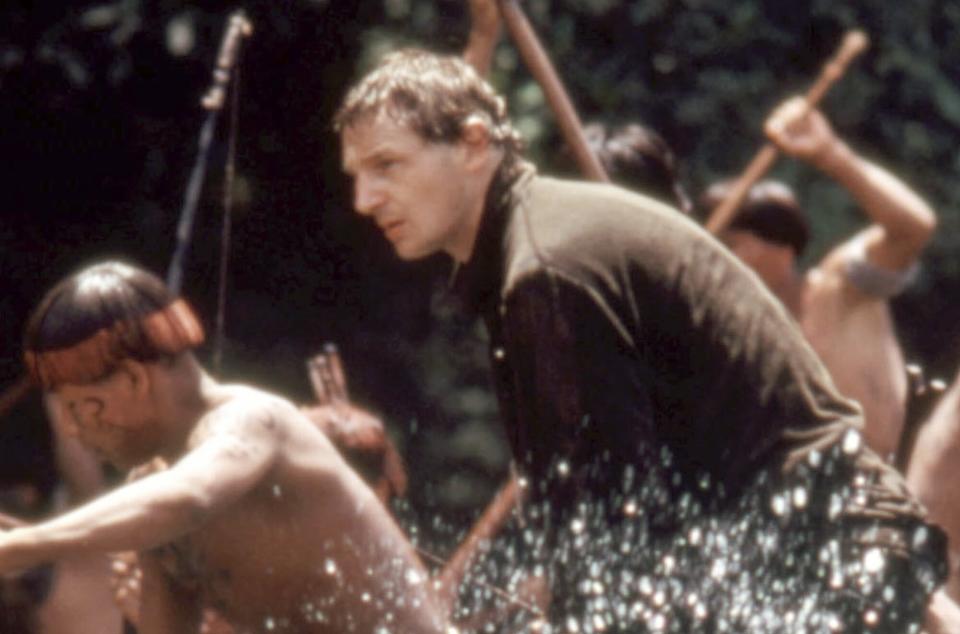
5. <i>Ordinary Love</i> (2019)
Joan (Lesley Manville) and Tom (Neeson) are a comfortably married couple, going about their domestic rituals after many years together with ease and good humor whilst living in the shadow of immeasurable loss. When Joan is diagnosed with breast cancer, Tom vows to stay by her side through it all, no matter what the outcome.
It would be tempting, based on the plot description alone, to write off Ordinary Love as another dewy eyed disease drama in which characters behave very bravely indeed over cups of tea. Yet its directors, Lisa Barros D'sa and Glenn Leyburn (Good Vibrations), wisely foreground the human element over the medical one; Ordinary Love is more a film about the rituals of marriage than anything else. (Its script, the first by playwright Owen McCafferty, was originally titled Normal People before the title was changed to avoid confusion with, well, Normal People.)
After many years of starring in action movies and appearing in smaller, meaty roles in movies like Widows and Silence, Neeson comes back in fighting form here to headline a straight drama. He and Manville create such a palpable sense of reality that, at times, the film threatens to become too close to the bone, almost dangerously raw, but the screenplay knows exactly when to pull back with some light comic relief. While Barros D'sa and Leyburn told EW that their "dream cast... felt like the makings of a real classic cinematic pairing," Manville also elaborated (in the same feature) that shooting on her costar's home turf made lensing the story's more arduous scenes a bit easier. "We were shooting in Belfast, most days with a pint of Guinness. Everything was fine after that!"
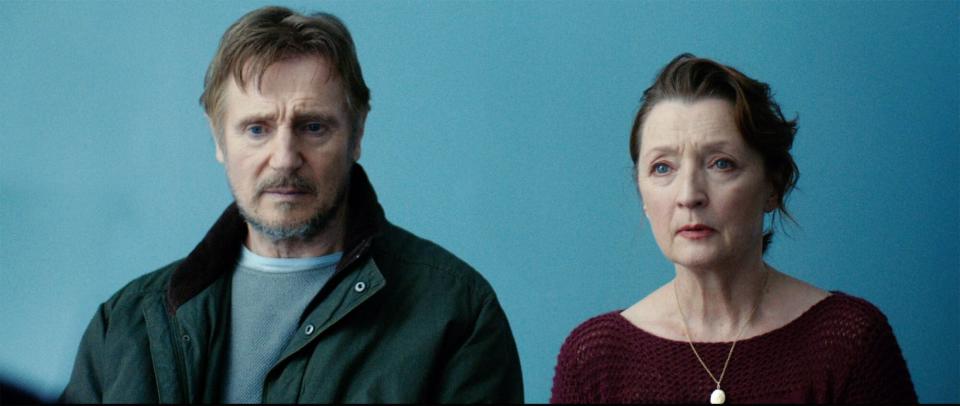
4. <i>Rob Roy</i> (1995)
Robert Roy McGregor (Neeson), a well-respected leader of a clan of Scottish Highlands cattle herders, takes a loan from James Graham (John Hurt), 4th Marquess of Montrose, to sustain his people through a harsh winter. Before the loan can be returned, Graham's poncy, anglicized relative Archibald Cunningham (Tim Roth) kills one of Roy's best men (Eric Stoltz) and makes off with the cash. Roy is then forced to go on the run from collectors, but when Cunningham sets his sights on the clan leader's wife (Jessica Lange), Roy must come out of hiding and avenge his family's honor.
Michael Caton-Jones (who would go on to direct, with supreme wit, the greatly misunderstood Basic Instinct 2) helmed this rousing medieval actioner, which in many ways is the first movie that introduced audiences to Liam Neeson's surprising and later much-deployed revenge skills. (In many ways, Rob Roy functions as a proto-Taken flick.) EW's Owen Gleiberman wrote in his 1995 review, "Rob Roy is a rousingly square romantic epic spiced with dashes of sex and bloodlust… that rarity, an old-fashioned entertainment you can actually believe in."
Gleiberman further raved: "Is there an actor alive with the soulful physicality, the resplendent masculine force, of Liam Neeson? Here, as in Schindler's List, he's a lion of a man, all strut and vision, invincible in his grandeur."
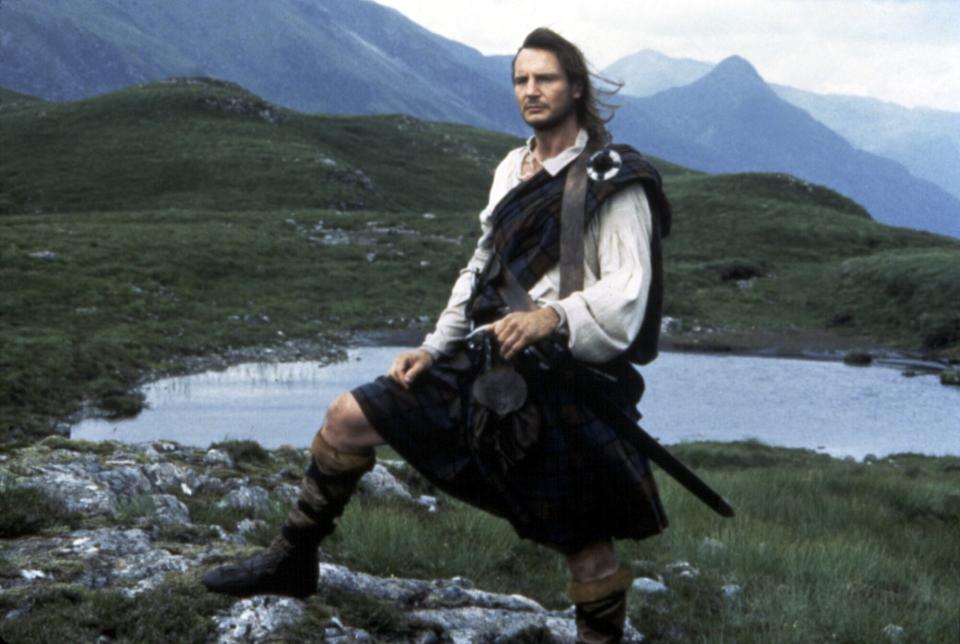
3. <i>Michael Collins</i> (1996)
Neil Jordan's well-mounted biopic, chronicling the last six years of the Irish Republican Army's infamous leader (and the man who negotiated the treaty freeing Ireland from Britain), boasts one of Neeson's most inspiring performances in the titular role, as well as solid turns from Alan Rickman and Aidan Quinn as Collins' compatriots, Éamon de Valera and Harry Boland, respectively. (Julia Roberts, on the other hand, seems to have gotten lost and wandered into a quavering brogue.)
As Collins — whom Neeson once referred to as the "founding father of guerilla warfare" — the actor finds the man's humanity and passion for the Irish people's liberation from Britain's rule coming vibrantly to the fore. The politics of the character are tremendously tricky to make appealing to a mainstream multiplex audience, yet Neeson accomplishes that great task with grace, showing us the best and the worst sides of Collins. It was likely Neeson's experience growing up in Ireland during the Troubles (which raged from the 1960s until 1998) that influenced the duality of his performance. "I never stop thinking about [the Troubles]," he told Irish Central in 2009. "I've known guys and girls who have been perpetrators of violence and victims. Protestants and Catholics. It's part of my DNA."
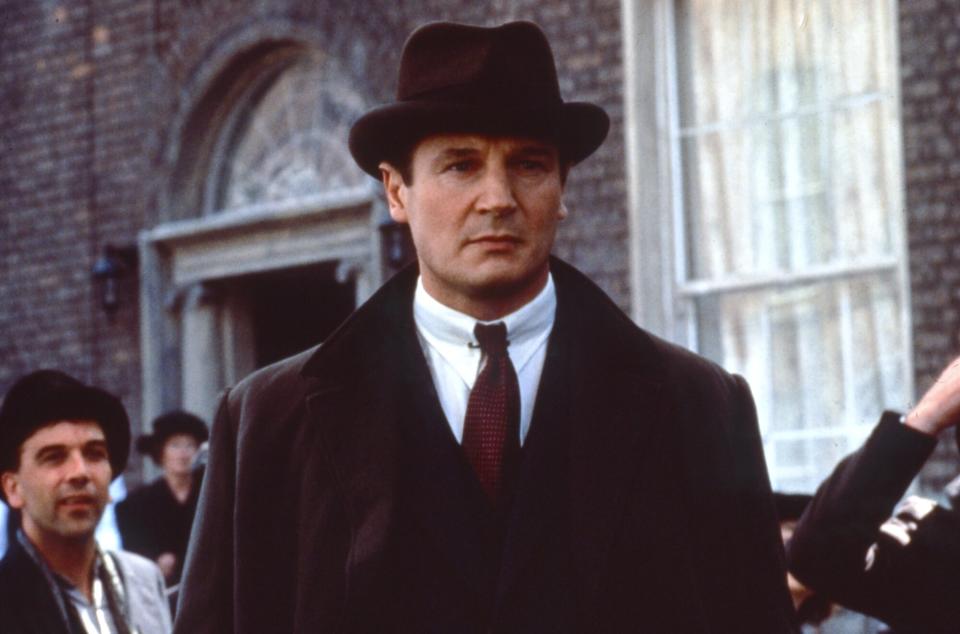
2. <i>Kinsey</i> (2004)
Biology professor Alfred Kinsey has managed to carve out a comfortable life for himself and his wife, Clara (Laura Linney in an Oscar-nominated performance), after breaking free of his overbearing father (John Lithgow). But things don't stay tranquil for long, especially once he realizes that his adult university students have little concept of human sexuality, prompting Kinsey to advocate for proper education on the topic. When this fails to meet the approval of his conservative colleagues, particularly sex-averse professor Thurman Rice (Tim Curry), Kinsey begins conducting his own research, consisting of interviews with volunteers who each share their sexual histories in great detail.
Bill Condon's sensational biopic, for which he also penned the wonderfully sardonic screenplay, is one of the best examples in American cinema for depicting sex in such an honest, unflinching fashion. Condon examines the sexual repression in our country with a straight-ahead and often surprisingly jocular approach that is utterly commendable.
As the eponymous groundbreaker, Neeson turns in one of his most charming and layered performances. Utterly obsessed with his research but equally devoted to his wife and four children, many of whom delight in sitting around the dinner table discussing their amorous activities, Kinsey is also a man living in repression from his scarring childhood. A scene in which the professor, long curious, finally experiments with homosexuality radiates a tragic yet passionate weight simply in the longing Neeson conjures with the smallest of gestures, being both subtle and wrenching in a way only an actor of Neeson's caliber could manage.
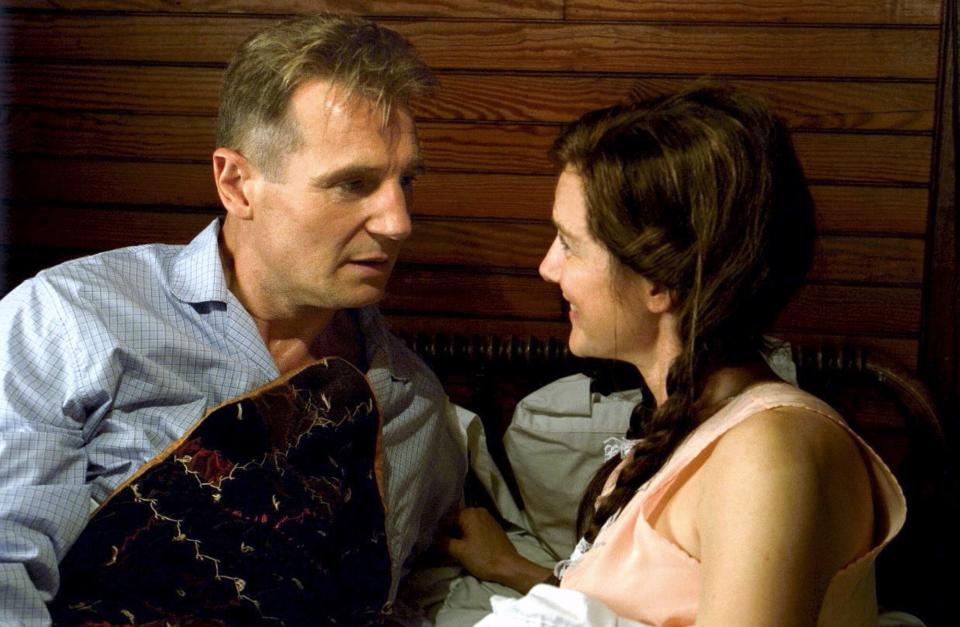
1. <i>Schindler's List</i> (1993)
In 1939, at the outbreak of World War II, shrewd businessman Oskar Schindler (Neeson) moves to Kraków and opens a factory. As a matter of business, rather than personal politics, Schindler joins the Nazi party and employs Jewish workers as cheap labor. But soon, the Fascists begin exterminating those in Kraków's ghetto — many of whom work for Schindler — and move the survivors to Płasów labor camp (overseen by the psychotic Amon Göth, played with an aristocratic sneer by Ralph Fiennes). When it becomes clear that the Nazis don't intend to let any of their captives live, Schindler turns his focus away from profits and onto people, resolving to protect as many as he can by designating them essential workers for his factory, thus saving the lives of 1,100 innocent Jews.
Widely regarded to be the most realistic fictional vision of the Holocaust put to screen, Steven Spielberg's seminal work of art is a miraculous feat: harrowing, nearly unwatchable at times, but brimming with humanity and even unexpected flourishes of humor. The entire cast, from Ben Kingsley as Schindler's accountant Itzhak Stern and the eminently gifted Embeth Davidtz as Göth's maid Helen Hirsch to each and every last background artist, so viscerally emulates the horror that only Spielberg's documentary-style assault could fittingly depict.
Schindler is written brilliantly here and played just as elegantly by Neeson. He is not a cut-and-dry hero; in fact, he stumbles into the role of savior much by accident. His dubious morality is positively electrifying, though he remains the only true-hearted person on the outside of the camp walls. In the second half of the film, when he makes his about-face, the compassion and hope he brings to those imprisoned offer as much relief to the audience as the people on screen.
The passage in which Schindler orders the Nazis to water down trainloads of prisoners, all the while laughing about it to convince Göth and his comrades that it's a sick joke to "give them hope," is one of the most finely staged suspense sequences in any film, as well as one of the most cathartic. And that wrenching final monologue, where, in the face of all those he saved, Schindler falls into despair, crying, "I could have saved more... I didn't do enough," will undoubtedly haunt and humble audiences for decades to come.
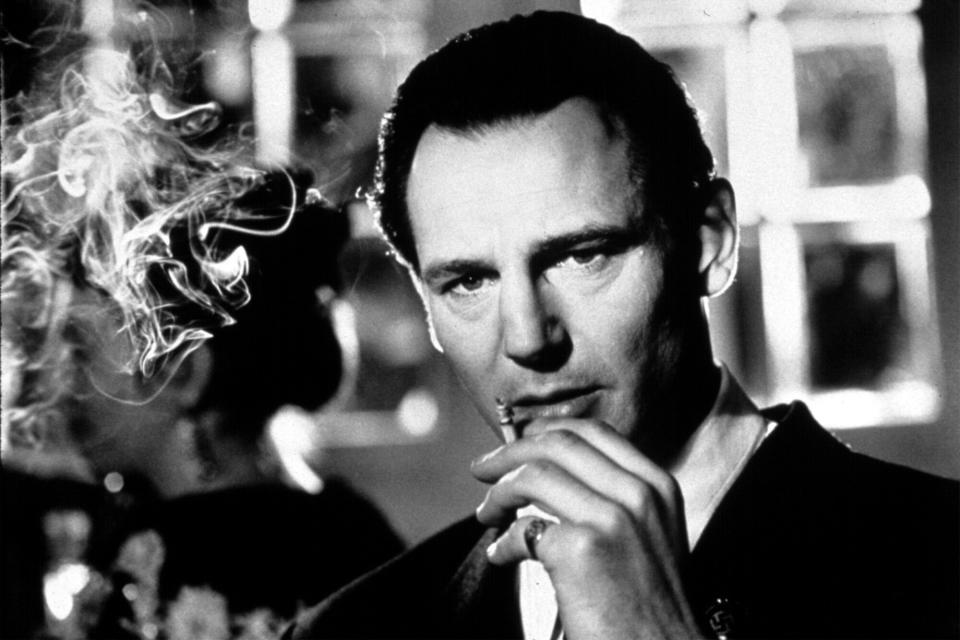
Related content:

